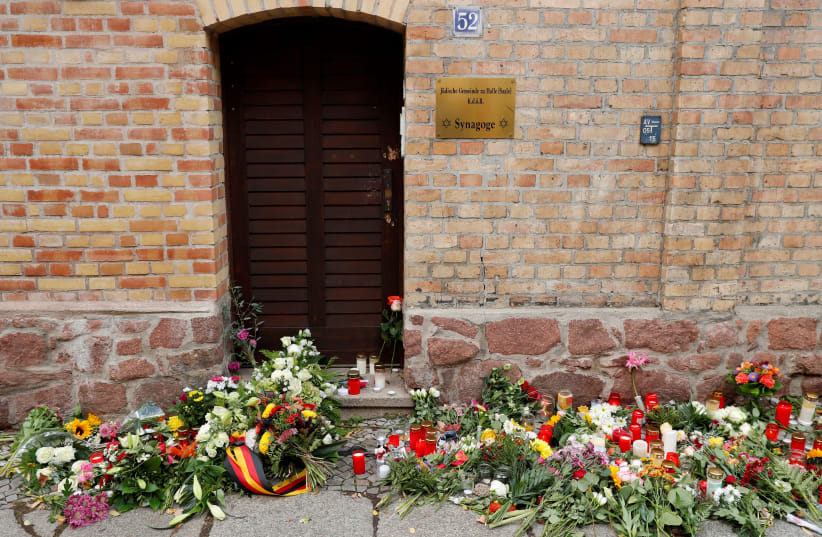Merkel’s response to the outbreak of antisemitic violence on Wednesday allegedly carried out by Stephan Balliet in the eastern German city 170 kilometers southwest of Berlin was to rush to a vigil outside of Berlin’s New Synagogue and have her spokesman, Steffen Seibert, declare: “We must oppose any form of antisemitism.”
Intelligence and counter-terrorism policies demand that Kemp – who has been at the forefront of combating global antisemitism for years and commanded Operation Fingal in Afghanistan in 2003 – be taken seriously.
Hence Kemp’s succinct counterpunch revealed Merkel’s lackluster performance in combating all forms of Jew-hatred in Germany.
Merkel consistently delivers comments and speeches on her country’s need to protect Jewish institutions. She told CNN in a May interview that Germany “always had a certain number of antisemites among us, unfortunately,” adding, “there is to this day not a single synagogue, not a single daycare center for Jewish children, not a single school for Jewish children that does not need to be guarded by German policemen.”
Merkel declined to say what the “certain number of antisemites” means. For example, a 2017 Bundestag study showed that 40% of the German population holds a contemporary antisemitic view, namely, the intense loathing of the Jewish state. How this disturbingly high level of antisemitic attitudes in Germany translates into indifference toward rising antisemitic violence is a question that warrants research.
The problem, however, as Kemp noted, is that Merkel does not seek to root out lethal antisemitism. She remains in a purely defensive and rhetorical posture.
Two other examples of antisemitic violence over the last week in Germany highlight the danger for Jews and Israelis.
A Syrian man sought to enter the Berlin Jewish community center and synagogue in Berlin’s Mitte district armed with a knife, shouting “Allahu akhbar” and “F*** Israel” as he approached the building. Berlin’s high tolerance for antisemitism, according to critics, prompted the authorities to swiftly release the Syrian man. A commentary in the mass-circulation Bild lambasted Berlin’s Mayor Michael Müller for his severe incompetence in combating rising antisemitism in the capital.
In the southern state of Bavaria, an Arabic-speaking man tossed a rock at the head of an Israeli woman after he heard her speaking Hebrew. The woman suffered a slight injury and the suspect fled the scene.
Julian Reichelt, editor-in-chief of the Bild, penned a profound and powerful commentary titled “Never Again.”
It is worth noting that the neo-Nazi Balliet was wedded to an antisemitic world view that included the “Zionist-occupied government” theory.
The crucible where antisemites from the extreme right-wing, left-wing and Islamism meet is a burning desire to smash the State of Israel.
Reichelt’s dialectic masterpiece of a commentary combined the past with the present and connected the dots of antisemitism that have been ignored and played down by Merkel’s administration, major media outlets and the larger society in the federal republic.
He cited German political inaction toward Kuwait Airways discrimination of an Israeli student, Adar M., who was refused service after he bought a ticket to travel from Frankfurt to Bangkok in 2016 because he is Israeli. Germany’s transportation minister, Andreas Scheuer, took no action against Kuwait Airways. Scheuer’s rhetoric, like Merkel’s, is on one side of the fence while his action remains on other side.
“When an antisemitic terrorist organization (Hezbollah) operates openly in Germany, our federal government does not dare to ban it,” Reichelt wrote.
The Central Council of Jews in Germany has urged Merkel to outlaw the lethal antisemitic terrorist entity Hezbollah. Merkel and her foreign ministry run by Heiko Maas have vehemently refused to ban Hezbollah and its 1,050 members and supporters in Germany, who spread a lethal antisemitic ideology.
The Jerusalem Post was the first to report in August on a Hezbollah-controlled center in the Germany city of Münster in which a Lebanese member declared: “We have pledged allegiance to Khamenei; we are accused of terrorism and are proud of it.”
The Post reported last week that Merkel’s government declined to label the commander-in-chief of Iran’s Islamic Revolutionary Guard Corps (IRGC) Gen. Hossein Salami’s call to “wipe Israel off the map” as antisemitic. Merkel and her foreign ministry insist on designating Salami’s talk mere “anti-Israel rhetoric.”
All of this helps to explain why the goalposts in Germany have moved in a direction that permits greater tolerance for lethal antisemitic activities and language. There is simply no real counter-terrorism policy targeting antisemitism in Germany. How can Merkel be expected to combat antisemitism in Germany when she declines to say that the Iranian regime’s call to exterminate more than six millions Israeli Jews is not antisemitic?
Merkel’s drive to protect the Iran nuclear deal and not upset the clerical regime appears to take priority over going on the offensive to combat Iranian regime antisemitism. Trade deals with the Islamic Republic of Iran remain front-and-center in the thinking and action of Merkel’s administration. In light of Merkel’s pro-Iranian regime policy, can her pledge via her spokesman Seibert that “We must oppose any form of antisemitism” be grounded in reality?
In addition to refusing to proscribe Hezbollah a terrorist entity, Merkel and her interior minister, Horst Seehofer, are opposed to outlawing the Palestinian terrorist entity the Popular Front for the Liberation of Palestine. The US and the EU have both classified the PFLP as a terrorist organization.
Germany has become a terribly unsafe country for Jews. Aliyah remains the best option for Germany’s 116,000-strong Jewish community.
The security climate will get progressively worse for Jews in Germany based on Merkel’s failure to aggressively confront antisemitism with action and not words. It is worth repeating Kemp’s wise advice: “As always, words only, when action is needed.”
